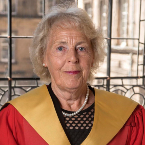In October 1972, exactly 50 years ago, the Committee on Nursing chaired by historian Asa Briggs reported its comprehensive analysis of how nursing and midwifery should develop to meet the demands of modern society and a rapidly changing healthcare system. There had been a stream of enquiries into the incalcitrant problems of recruitment and retention in nursing and its outdated model of training. The Briggs Report was the breakthrough.
Many of today’s nurses may not know about ‘Briggs’, even though the roots of their better education and the profession’s now-assumed role in evidence-based healthcare can be traced back to this influential report. It set in train the first radical reform of nurse education since Nightingale and, importantly, it recommended that nursing “should become a research-based profession” [p.108, para 370].
The Briggs Report led to the Midwives and Health Visitors Act 1979. In turn, this brought control of standards, discipline and education under a single UK-wide statutory body, the United Kingdom Central Council (now the Nursing and Midwifery Council). Briggs set out a template for a 3-year modular education programme with an 18-month foundation course followed by Branch specialization (adult, children, mental health, learning disability), leading to Registration. This evolved into the curriculum launched in 1986 as ‘Project 2000’. At last, student nurses would be supernumerary to the workforce and with their educational award raised to a Higher Education Diploma.
The Briggs committee did not think that all nursing and midwifery education should be integrated into the higher education system, but noted the “scope for expansion” [p.14, para 49]. It suggested, “the number of graduates is likely to remain small, but an increasing proportion of the profession” – between 2 and 5% [p.82 para 259]. Did that reflect nervousness about the opposition to nursing degree courses? Or did the Committee fear that universities would not welcome a large profession without an academic track record? At the time, there were just a few university-based nursing departments in the UK, and it would take 30 years and more before the government announced in 2009 that by 2013 all newly registering UK-educated nursing staff must hold a degree.
In contrast, Briggs had no reservations about pressing for the development of research in nursing. The report noted that although the active pursuit of research would be limited to a minority, “a sense of the need for research should become part of the mental equipment of every practicing nurse or midwife” [p. 108, para 370].
For anyone involved in the early beginnings of nursing research in the UK, ‘Briggs’ gave credence and momentum to that exciting but challenging mission. In October 1972, I was beginning the second year of my PhD on a Nursing Research Training Fellowship and attached to the Department of Nursing Studies at Edinburgh University, with a desk in the Nursing Research Unit. The unit started in 1971 with Lisbeth Hockey as Director, preempting Briggs’ recommendation for such units at the instigation of the Head of Nursing Studies, Margaret Scott Wright. – A former Matron with a PhD, Margaret was the first nursing professor in Europe… and a member of the Briggs Committee.
Other members included Sheila Collins, Sue Pembrey and Margaret Auld who all went on to become early recipients of RCN Fellowship. One of the Committee’s research assistants was Christine Hancock who later led the RCN as General Secretary. Indeed, the RCN – and in particular many of its Fellows – have given expertise and leadership to the numerous developments in nursing education and research that can be traced back to the impetus of the Briggs Report.
HMSO 1972 Report of the Committee on Nursing. Chairman Professor Ada Briggs, CMND. 5115, HMSO, London
Photo credit: University of Edinburgh







